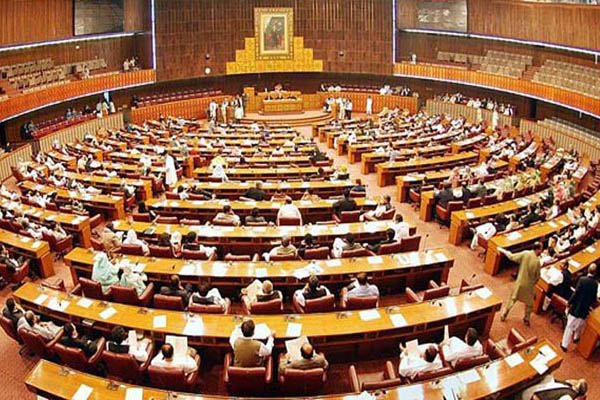
File photo
Supplementary finance bill imposes 17% taxes on approximately 150 goods in line with ‘prior actions’ required by IMF to revive loan facility
Finance Minister Shaukat Tarin presented the long-pending supplementary finance bill in the National Assembly on Thursday, fulfilling one of the “prior actions” required by the International Monetary Fund (IMF) to revive a suspended $6 billion loan facility.
In addition, the government also presented the State Bank of Pakistan (Amendment) Bill, 2021, granting autonomy to the central bank—another requirement of the IMF—and submitted eight resolutions to extend various ordinances, including the Tax Laws (Third Amendment) Ordinance, 2021 and the Federal Government Properties Management Authority Ordinance, 2021.
The National Assembly’s proceedings were marred by the opposition’s protests against the “mini-budget,” which they slammed for imposing additional taxes on essential commodities that risked burdening the common man with even more inflation.
Naveed Qamar of the Pakistan Peoples Party also condemned the government’s move to extend ordinances, claiming it was “unconstitutional” to extend expire presidential ordinances. However, Adviser to the P.M. on Parliamentary Affairs Babar Awan clarified that the government was extending the ordinances prior to their expiry and this was as per law.
Pakistan Muslim League (Nawaz) leader Khawaja Asif, meanwhile, accused the Pakistan Tehreek-e-Insaf (PTI)-led government of “selling” the sovereignty of Pakistan by accepting all the demands of the IMF. “The nation is ashamed of what is happening in the House today,” he said, adding that the government’s SBP legislation placed the central bank under the “control” of the global lender. He also reminded the PTI of its promises prior to the 2018 general elections, urging them to admit they had lied to the people.
In the PTI’s defense, Planning Minister Asad Umar reiterated the government’s allegations of the opposition parties being responsible for the country’s economic doldrums—despite now being in its fourth year in government.
Addressing media, PMLN spokesperson Marriyum Aurangzeb claimed the “mini-budget would cause more inflation to burden the masses.” She said the opposition would protest the government’s measures both inside and outside Parliament. “Prime Minister Imran Khan lies every day, he should be held accountable for the soaring inflation,” she said and reiterated accusations of the PTI “enslaving” Pakistanis to the IMF.
Sales tax burden
Under the finance bill presented to Parliament, approximately 150 goods that had earlier either been tax exempted or been subsidized by the government would be charged a flat rate of 17% General Sales Tax. The following items all face tax hikes or exemptions that are likely to be passed onto the consumer:
- Income tax rate on mobile phone calls to increase from 10% to 15%
- Tax exemptions for imported meat and poultry items
- GST rate on cars above 1,000cc to be hiked to 17%, while tax on import of electric vehicles in CBU conditions to increase from 5% to 17%.
- Tax exemptions on raw materials for imported milk to be withdrawn and 17% taxes to be imposed
- Duty-free shops, for the first time, to be taxed at 17%.
- Bread prepared in bakeries, restaurants, food chains and shops to be taxed at 17%, while earlier it was tax exempt.
- Sales tax on prepared foodstuff and sweetmeats supplied by restaurants, bakeries, and sweet shops to be hiked to 17%.
- Goods received as gifts from a foreign government or organization to be taxed at 17%.
- Cottonseed to be taxed at 17%, while taxes of machinery for the poultry sector would be increased from 7% to 17%. Taxes would also be imposed on red chilies, cereals and crude vegetable oil
- GST on silver and gold to increase from 1% to 17%. Taxes of 5% to be imposed on computers, laptops and notebooks.
- Raw material for medicines to be taxed at 17%.
- Advance tax to be imposed on foreign-produced TV dramas and serials as well as advertisements starring actors from other countries
- Items sold in sachets to be subjected to a GST of 17% against the existing 8%
- Seeds, plants, tools and chemicals of the agriculture sector to be subjected to 17% GST.
- 10% sales tax to be imposed on imported vegetables.
- 10% tax to be levied on flour mills.
- 5% tax on fitness centers, laundries, beauty salons, travel agencies, industrial machinery workshops and automobile workshops in Islamabad.
- An increase of 5% withholding tax on telecommunication services.
- Sales tax on car batteries to be increased from 12% to 17%.
- 17% GST will be imposed on processed milk and dairy items sold in branded packaging as well as items sold in restaurants and sweet shops.
- 17% GST will be imposed on imported animals and livestock.
- 17% GST will be imposed on imported infant formula milk, up from the existing 0%
According to the bill, the end of tax exemption on imported food items would impose an additional burden of Rs. 215 billion. The bill also calls for adding taxes on the production and sale of contraceptives, a seeming contradiction from the government’s plans to boost family planning measures.
The finance bill would be debated in the Lower House from today (Friday). The government wishes to have it passed before Jan. 12, when the IMF Executive Board is set to meet and determine whether or not to revive the suspended loan facility and release a tranche of $1 billion. Resumption of the bailout would enable Pakistan to avail several other loan facilities and aid programs, which is considered essential to overcoming the issues facing the national economy, according to government spokesmen.
